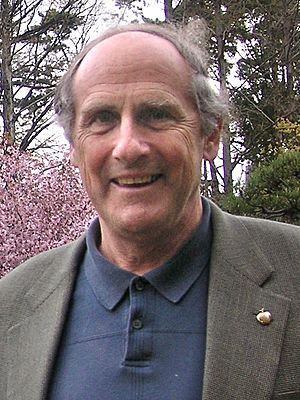Ralph Steinman facts for kids
Quick facts for kids
Ralph Steinman
|
|
|---|---|
 |
|
| Born | January 14, 1943 |
| Died | September 30, 2011 (aged 68) |
| Nationality | Canadian |
| Citizenship | Canadian |
| Alma mater | McGill University Harvard University |
| Known for | Discovery of dendritic cells and its role in adaptive immunity |
| Awards | 2011 Nobel Prize in Physiology or Medicine (posthumous) |
| Scientific career | |
| Fields | Immunology and cell biology |
| Institutions | Rockefeller University, New York City |
| Academic advisors | Elizabeth Hay (Harvard) James G. Hirsch and Zanvil A. Cohn (Rockefeller University) |
Ralph Marvin Steinman (born January 14, 1943 – died September 30, 2011) was a Canadian scientist. He was an immunologist, which means he studied the immune system and how our bodies fight off sickness. He was also a cell biologist, meaning he studied tiny living parts called cells. He worked at Rockefeller University in New York City.
Ralph Steinman is famous for discovering a special type of cell in our immune system. He named these cells dendritic cells. He found them while working in a laboratory with another scientist named Zanvil A. Cohn.
Contents
Discovering Dendritic Cells
Ralph Steinman's most important discovery was the dendritic cell. These cells are like the "sentinels" or "messengers" of our immune system. They find harmful things like viruses or bacteria in the body. Then, they show parts of these invaders to other immune cells, teaching them how to fight off the specific threat. This process is called adaptive immunity, which is how our body learns to protect itself from different diseases over time.
How Dendritic Cells Work
Imagine your body is a castle, and the immune system is its defense team. Dendritic cells are like scouts who go out, find invaders, and bring back a "wanted poster" to the main army (other immune cells). This helps the army create a very specific plan to defeat that particular invader. Without dendritic cells, our immune system would not be as good at remembering and fighting off infections we've had before.
Nobel Prize Award
On October 3, 2011, Ralph Steinman was awarded one half of the Nobel Prize in Physiology or Medicine. This was for his amazing discovery of the dendritic cell and its important role in how our body's immune system learns to fight diseases.
A Posthumous Award
Sadly, the Nobel Committee did not know that Ralph Steinman had passed away three days earlier, on September 30, 2011. He died from pancreatic cancer. Usually, the Nobel Prize is not given to someone after they have died. However, because the decision to give him the award was made before they knew he had passed, the committee decided to let the award stand.
Ralph Steinman's daughter shared that he had joked about holding on until the prize announcement. He knew that the prize was not given posthumously and wanted to make it to the announcement.
Other Awards and Honors
Throughout his life, Ralph Steinman received many other important awards and recognitions for his work on dendritic cells. These included:
- The Albert Lasker Award in 2007
- The Gairdner Foundation International Award in 2003
- The Cancer Research Institute William B. Coley Award in 1998
He also became a member of important scientific groups, like the Institute of Medicine (U.S.A.) in 2002 and the National Academy of Sciences (U.S.A.) in 2001.
See also
 In Spanish: Ralph M. Steinman para niños
In Spanish: Ralph M. Steinman para niños
 | Delilah Pierce |
 | Gordon Parks |
 | Augusta Savage |
 | Charles Ethan Porter |

